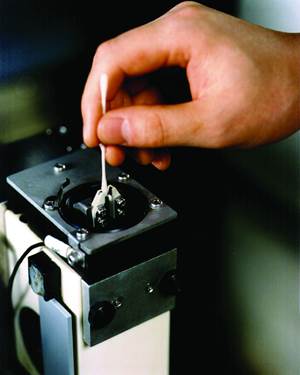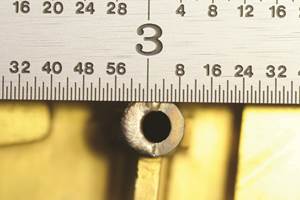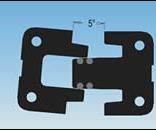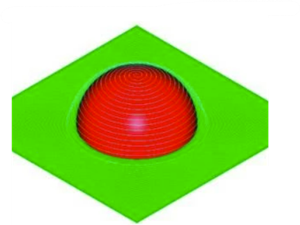Metal Cutting Solutions/Manufacturing Techniques
Turbo 10/Double Octomill™/Square 6™
At EMO 2013, Seco Tools will spotlight innovative metal cutting solutions paired with unique manufacturing techniques in Hall 4, Booth A56. Products on display will include an enhanced Turbo 10 series of square shoulder mills, the Double Octomill™ face milling cutter and the Square 6™ milling cutter.
The enhanced Turbo 10 series of square shoulder milling cutters now includes more inserts with new geometries and radii as well as helical cutters for increased machining flexibility in tough materials. The insert range expansion includes both direct pressed and ground insert alternatives with corner radii ranging from 0.4 mm to 3.1 mm. The new geometries for the ground insert range provide increased performance in materials with unique challenges, including aluminum, stainless steels and titanium alloys.
The new helical cutters are ideal for helical shoulder milling applications that require process stability, flexibility and high precision. The cutters are available in diameters ranging from 20 mm to 54 mm and include Weldon, Seco Weldon, Combimaster heads, Seco-Capto and Arbor mounting options.
All Turbo 10 cutters include precision milled pocket seats that improve run-out, stability and tool life by providing optimal contact between the tool body and insert. Integrated through-coolant channels is said to support high productivity and promote excellent chip evacuation. Because of their high levels of flexibility, Turbo 10 cutters work in slotting, shouldering, ramping, facing, pocketing, plunging and turn milling applications.
The Double Octomill face milling cutter is highly versatile in that it can be used for both roughing and finishing operations. And while more traditional face mills typically use inserts with four edges, the Double Octomill provides 16 cutting edges to minimize cost per edge for a lower cost per part.
Seco achieves 16 cutting edges because each pocket on the Double Octomill cutter features a negative axial angle that allows for the use of double-sided inserts. The inserts themselves use a positive rake angle to minimize power consumption while achieving higher cutting speeds for a significant increase in productivity, the company states.
Furthermore, Seco is reported to be the only company to develop insert pockets with a strong center lock screw and grooves for axial and radial high speed steel (HSS) location pins. These pins increase tool life because the pockets do not wear out as fast when compared with a traditional face mill. Additionally, each pocket features a hard HV 700 coating that protects the tool from wear and prevents chips from welding onto the cutter.
The Double Octomill is available in three different pitch versions. On the normal and normal+ versions, the insert locks into place via a center lock mounting with a strong screw. The close pitch version offers wedge mounting using a new, stronger and self-orientating wedge.
With three cutting edges on each side, six in total, Square 6 cutters provide lower cost per cutting edge and bring enhanced performance to a variety of operations, including face milling, contouring, plunging, slotting and square shoulder milling. The Square 6 features a hardened-steel, nickel coated cutter body to extend its tool life. The cutter’s pockets are precision machined to ensure the insert locates at a true 90-degree angle. With three different pitch designs in both inch and metric diameter ranges, the Square 6 reduces vibrations, improves surface finishes and increases part quality, the company adds.
With three geometries, two radii, eight grades and six indexable cutting edges, the Square 6’s peripheral ground inserts allow users to achieve greater accuracy, exacting tolerances and high-quality part surface finishes when machining tough materials.
Related Content
Maintaining a Wire EDM Machine
To achieve the ultimate capability and level of productivity from your wire EDM on a consistent, repeatable and reliable basis, regular maintenance is a required task.
Read MoreLaser Welding Versus Micro Welding
The latest battle in finely detailed restoration/repair of mold materials.
Read MoreSolving Mold Alignment Problems with the Right Alignment Lock
Correct alignment lock selection can reduce maintenance costs and molding downtime, as well as increase part quality over the mold’s entire life.
Read MoreRead Next
Reasons to Use Fiber Lasers for Mold Cleaning
Fiber lasers offer a simplicity, speed, control and portability, minimizing mold cleaning risks.
Read MoreHow to Use Continuing Education to Remain Competitive in Moldmaking
Continued training helps moldmakers make tooling decisions and properly use the latest cutting tool to efficiently machine high-quality molds.
Read MoreAre You a Moldmaker Considering 3D Printing? Consider the 3D Printing Workshop at NPE2024
Presentations will cover 3D printing for mold tooling, material innovation, product development, bridge production and full-scale, high-volume additive manufacturing.
Read More











.png;maxWidth=300;quality=90)













